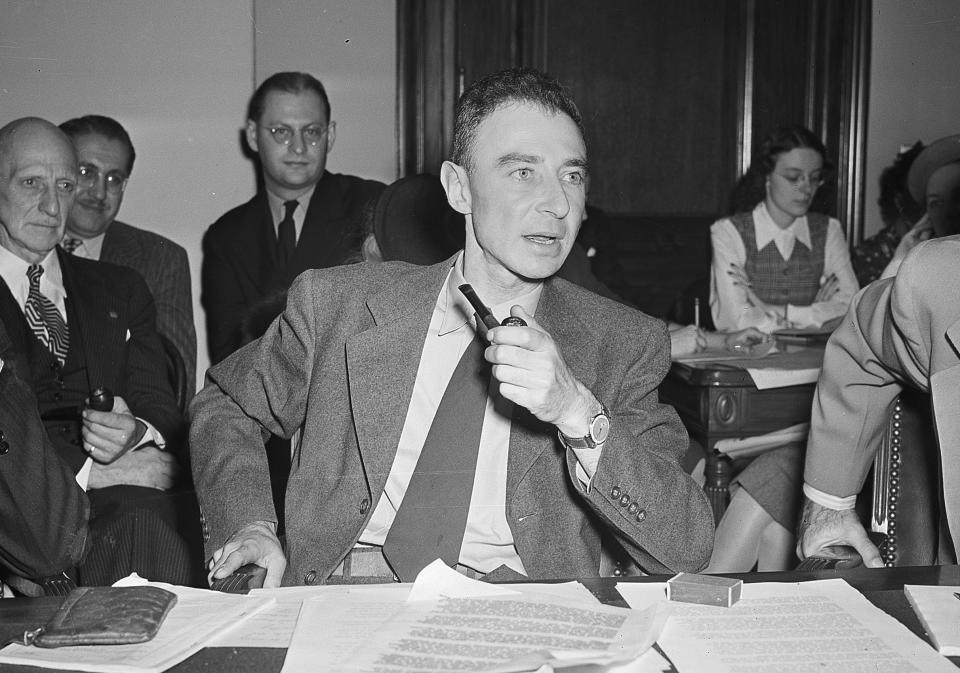Christopher Nolan Chooses Universal Pictures For His Film About J. Robert Oppenheimer & The A-Bomb
- Oops!Something went wrong.Please try again later.
- Oops!Something went wrong.Please try again later.
- Oops!Something went wrong.Please try again later.
- Oops!Something went wrong.Please try again later.

EXCLUSIVE: Universal Pictures has landed the right to finance and distribute the next film that Christopher Nolan will direct, based on his script about J. Robert Oppenheimer and his role in the development of the atom bomb.
A theoretical physicist who became the director of the Los Alamos Laboratory, Oppenheimer headed the research and development of the bomb that ended WWII, under what was covertly called the Manhattan Project. Nolan will produce the film alongside his wife and longtime producing partner Emma Thomas for their Syncopy Inc. banner.
More from Deadline
Sources said that the film is now greenlighted to begin production in the first quarter of 2022. When Deadline broke the story a few days ago about this film being shopped, I’d heard Nolan’s longtime collaborator Cillian Murphy was in the mix for a key role. That still might happen, but I’m persuaded there are no definitive casting attachments at this point.
AP Photo
So ends a long, charmed run between Nolan and Warner Bros, which yielded The Dark Knight trilogy, Inception, Dunkirk and most recently Tenet. I’ve heard the courtship of Nolan came down to Universal, MGM and Sony. Warner Bros. wasn’t in the final mix, but Nolan and his WME rep Dan Aloni had conversations with Toby Emmerich and Ann Sarnoff as recently as last week.
This is exactly the kind of event film that Universal chief Donna Langley does so well, backing filmmakers with the support of the studio’s global marketing and distribution machine behind her, the one that led to F9 become the biggest global movie of the year so far. Like MGM’s Michael De Luca and Sony’s Tom Rothman, Langley falls in line with just-deposed Paramount studio chief Jim Gianopulos as throwback filmmaker-first execs in a moment when corporate players are leaning hard into streaming services and prioritizing them over theatrical and the status quo. I wonder if Paramount might have been a player, had Gianopulos not been ousted in the middle of this derby, a signal that the studio also is leaning toward prioritizing streaming. Langley’s long track record of championing filmmakers and event-izing original films for a global audience had to be comforting to Nolan and Thomas.
Nolan and Warner Bros’ experience on Tenet was a rough one for both because of its release during the pandemic, even though the global numbers turned out fine. But the filmmaker seemed particularly incensed when WarnerMedia chief Jason Kilar blindsided every filmmaker who had a film on the Warner Bros 2021 slate by mandating a day-and-date release to build paid subscriber numbers on its HBO Max streaming service while theatrical attendance continued to look shaky in the prolonged pandemic. I’ve thought a lot about this between creative and corporate during a sleepy Toronto, where the highlight was watching the Warner Bros/Legendary epic Dune on an Imax screen at the Ontario Place Cinesphere as part of the TIFF festival.
Director Denis Villenueve spoke before, and said that when he and cinematographer Greig Fraser did their dreaming on the film, it was all geared for “that screen,” he said, pointing to the massive Imax screen. Watching the movie on such a big canvas with pristine sound brought back memories of the pleasure I felt watching world-creation movies like the original Star Wars, The Lord of the Rings and Avatar. The scope of Villenueve’s imagination was maximized by the sights, sounds and state of the art Imax spectacle. It was understandable why Legendary, which paid for most of the film’s budget, locked horns with WarnerMedia on the day/date strategy. While some at the studio note that Legendary could have opted to skip 2021 and gone the theatrical route in a year, filmmaker advocates might ask why an exception could not have been made, particularly since the elite A-list director Villenueve plans more Dune installments. He was also an outspoken critic of WarnerMedia’s day-and-date move. The film had already been delayed several times, and who wants to let a revenue event like this sit another year, paying interest on the money spent? I can say with certainty that anyone who sees Dune on their iPhone or big screen TV will be doing this film and themselves an injustice. Dune is one of those films — Nolan’s Inception, Dunkirk and the Dark Knight films are others — that fire on all cylinders when viewed on the biggest possible screen with the best possible sound. The film’s final frames note this was only the first installment. One hopes that the bifurcated day-and-date HBO Max/theatrical release doesn’t endanger those future installments.
Warner Bros
The best way that elite filmmakers can control how their films unspool is to take the route that Nolan and his WME reps did here and control their destiny through dealmaking. The financial part of this was relatively simple; the deal followed the template of the one Nolan has operated under at Warner Bros. So this came down to WarnerMedia’s day/date move costing Warner Bros a cornerstone director who at age 51 is in his prime with a lot of stories left to tell, and it is a potentially important pushback from a theatrical film purist in this streaming juggernaut moment.
It is just another day in fast-evolving Hollywood, with the shifting sands that comprise a big visual element in Dune, as giant worms sometimes swallow up those who disturb the sandscape and don’t have the dexterity to pivot, or stay in one place too long.
Best of Deadline
New On Disney+ For September: Daily Schedule Of Movies, TV & Originals
New On Hulu In September: Daily Streaming Schedule For TV, Movies & More
New On Amazon Prime Video In September: Daily Listings For Streaming Movies, TV & More
Sign up for Deadline's Newsletter. For the latest news, follow us on Facebook, Twitter, and Instagram.



